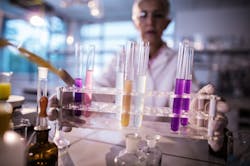Biochemists at UCLA devised a way to convert sugar into a variety of useful chemical compounds without using cells.
The new approach, called synthetic biochemistry, overcomes the limitations of synthetic biology, the researchers said.
“The idea of synthetic biology is to redesign cells so they will take sugar and run it through a series of chemical steps to convert it into a biofuel or a commodity chemical or a pharmaceutical,” said James Bowie, a professor of chemistry and biochemistry in the UCLA College, and senior author of the new study. “However, that’s extremely difficult to do. The cell protests. It will take the sugar and do other things with it that you don’t want, like build cell walls, proteins and RNA molecules. The cell fights us the whole way.”
Synthetic biochemistry bypasses the need for cells.
The biochemists purified more than two dozen enzymes in particular combinations and concentrations, put them in a flask and added glucose. The enzymes and pathways created in Bowie’s laboratory are not necessarily found in nature, UCLA said.
“When we don’t have to worry about keeping cells happy, it’s easier to rearrange things the way we want,” Bowie explained.
The research, published in the journal Nature Chemical Biology, demonstrates that the new technique can generate complex enzyme systems outside the cell that function well enough to be useful for the production of biofuels and commodity chemicals.
Synthetic biochemistry could be used to produce a wide range of industrial products, including plastics, flavors and scents, and perhaps eventually biofuels, Bowie said.
So far, the researchers have achieved a yield of approximately 90 percent for the production of a biodegradable plastic. They are working to overcome remaining challenges, including regulating the production of high-energy molecules needed for biochemical reactions.


